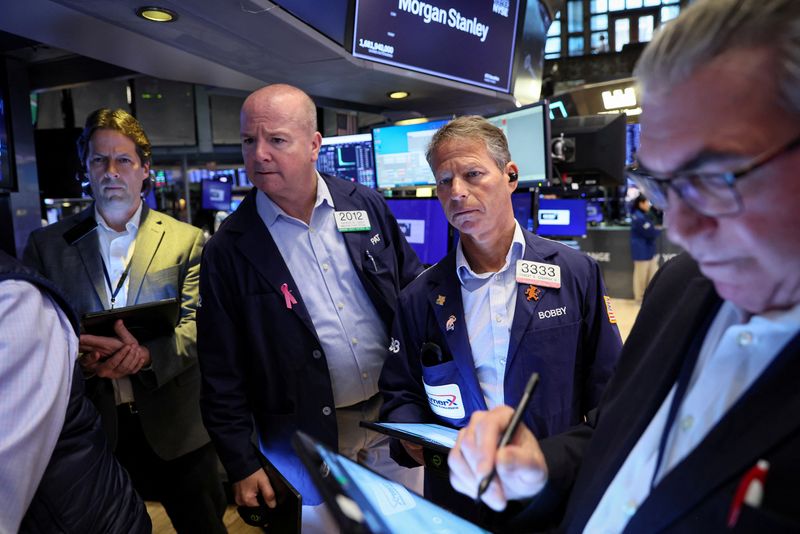 © Reuters. FILE PHOTO: Traders work on the floor of the New York Stock Exchange (NYSE) in New York City, U.S., April 19, 2023. REUTERS/Brendan McDermid
© Reuters. FILE PHOTO: Traders work on the floor of the New York Stock Exchange (NYSE) in New York City, U.S., April 19, 2023. REUTERS/Brendan McDermid
By Lewis Krauskopf, Sruthi Shankar and Ankika Biswas
(Reuters) - Major U.S. stock indexes ended lower on Thursday after disappointing quarterly reports from companies including Tesla (NASDAQ:TSLA) and AT&T (NYSE:T), while investors sought clarity on the path of interest rates.
Tesla shares tumbled 9.7% after the electric vehicle maker posted its lowest quarterly gross margin in two years and signaled it would continue to slash prices. AT&T shares dropped 10.4% after the wireless carrier missed market estimates for first-quarter revenue and free cash flow.
The S&P 500's rally to start the year is set to be tested by a first-quarter earnings season that investors expect to show tepid results. So far, analysts have largely retained last week's expectations of a near-5% year-on-year fall in quarterly profits at S&P 500 companies, according to Refinitiv data.
“The market has been overbought for the last week or two," said Anthony Saglimbene, chief market strategist at Ameriprise Financial (NYSE:AMP). "Now that we are going to start the heart of earnings season, you are going to see that demand is slowing, corporate profits are coming down and there really isn’t a whole lot of catalysts to motivate buyers.”
The Dow Jones Industrial Average fell 110.39 points, or 0.33%, to 33,786.62, the S&P 500 lost 24.73 points, or 0.60%, to 4,129.79 and the Nasdaq Composite dropped 97.67 points, or 0.8%, to 12,059.56.
In other earnings news, American Express Co (NYSE:AXP) profit missed Wall Street estimates and its shares fell 1%.
Shares of several regional banks fell after results, including 2.7% drops for both Comerica (NYSE:CMA) Inc and KeyCorp (NYSE:KEY). Regional banks have been in focus since the failure last month of Silicon Valley Bank raised investor concerns about systemic risks.
Shares of Lam Research (NASDAQ:LRCX) rose 7.2% after the chip-making equipment supplier's revenue topped estimates, while shares of D.R. Horton increased 5.6% after the homebuilder forecast full-year revenue above estimates.
Investors are assessing the path for interest rates, and many expect a slowing U.S. economy could lead the Federal Reserve to start cutting rates later this year as the central bank juggles its fight against inflation. Data showed the number of Americans filing new claims for unemployment benefits increased moderately last week, suggesting the labor market was gradually slowing.
Markets were focused on a bevy of Fed officials speaking at the end of the week ahead of the central bank's meeting early next month, when investors widely expect a 25 basis point hike.
Dallas Fed President Lorie Logan said she is assessing whether the Fed has made enough progress on fighting inflation based on three markers, including "further and sustained" improvement in measures of inflation.
Adding to worries, the cost of insuring exposure to U.S. sovereign debt rose to the highest level in over a decade as investors fretted about negotiations in Washington to raise the U.S. government debt ceiling.
Declining issues outnumbered advancing ones on the NYSE by a 1.74-to-1 ratio; on Nasdaq, a 1.79-to-1 ratio favored decliners.
The S&P 500 posted 23 new 52-week highs and 3 new lows; the Nasdaq Composite recorded 58 new highs and 134 new lows.
About 9.9 billion shares changed hands in U.S. exchanges, compared with the 10.5 billion daily average over the last 20 sessions.

